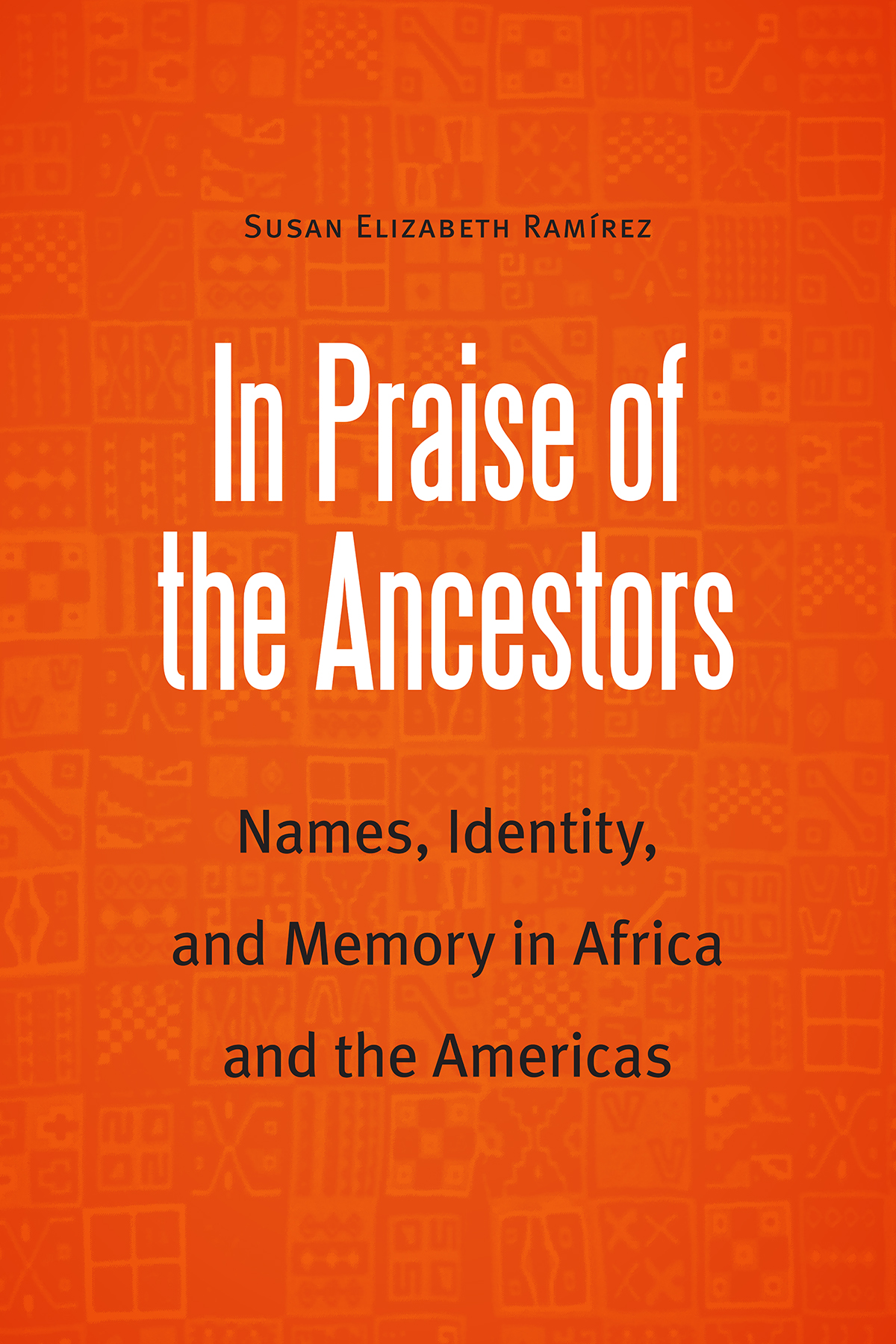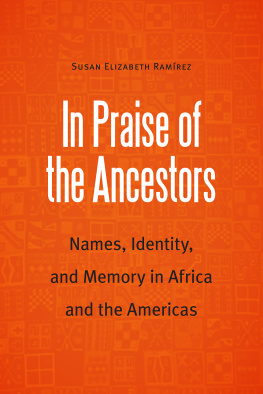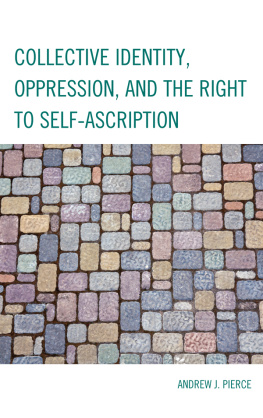
This book expresses a fresh and durably important answer to questions about how precapitalist states and federations envisioned time and change. Ethnographers on four continents have repeatedly intuited that kingdoms and federations purposely made history in a patterned way. But on what pattern, and why? This book is a big deal. Its short, original, engrossing, and brightly lit up with cross-cultural insight.
Frank Salomon, John V. Murra Professor Emeritus of Anthropology at the University of WisconsinMadison and past president of the American Society for Ethnohistory
Borderlands and Transcultural Studies
Series Editors:
Roslyn LaPier
Rudy Guevarra
Paul Spickard
In Praise of the Ancestors
Names, Identity, and Memory in Africa and the Americas
Susan Elizabeth Ramrez
University of Nebraska Press | Lincoln
2022 by the Board of Regents of the University of Nebraska
Portions of chapter 4 first appeared as Historia y memoria: La construccin de las tradiciones dinsticas andinas, Revista de Indias 66, no. 236 (2006): 1354.
Cover designed by University of Nebraska Press; cover background image is from the interior.
All rights reserved
The University of Nebraska Press is part of a land-grant institution with campuses and programs on the past, present, and future homelands of the Pawnee, Ponca, Otoe-Missouria, Omaha, Dakota, Lakota, Kaw, Cheyenne, and Arapaho Peoples, as well as those of the relocated Ho-Chunk, Sac and Fox, and Iowa Peoples.
Publication of this volume was assisted by the Department of History and the AddRan College of Liberal Arts, Texas Christian University.
Library of Congress Cataloguing in Publication Data
Names: Ramrez, Susan E., 1946 author.
Title: In praise of the ancestors: names, identity, and memory in Africa and the Americas / Susan Elizabeth Ramrez.
Other titles: Names, identity, and memory in Africa and the Americas
Description: Lincoln: University of Nebraska Press, [2022] | Series: Borderlands and Transcultural Studies | Includes bibliographical references and index.
Identifiers: LCCN 2021058268
ISBN 9781496230256 (Hardback: acid-free paper)
ISBN 9781496231475 (Paperback: acid-free paper)
ISBN 9781496232069 (ePub)
ISBN 9781496232076 ( PDF )
Subjects: LCSH : Names, PersonalLuba-LuluaCase studies. | Names, PersonalIroquoisCase studies. | Names, PersonalAndeanCase studies. | OnomasticsAfrica, Sub-SaharanCase studies. | OnomasticsAndesCase studies. | OnomasticsAmericasCase studies. | Oral traditionCase studies. | Lulua (African people)Social life and customs. | Iroquois IndiansSocial life and customs. | IncasSocial life and customs. | BISAC : SOCIAL SCIENCE / Ethnic Studies / African Studies | SOCIAL SCIENCE / Ethnic Studies / Caribbean & Latin American Studies
Classification: LCC CS 2305 . R 36 2022 | DDC 929.4dc23/eng/20220209
LC record available at https://lccn.loc.gov/2021058268
The publisher does not have any control over and does not assume any responsibility for author or third-party websites or their content.
For Helen Elizabeth McCartney de Ramrez, a mother whose support, generosity, and love were never lacking, and Fernando Arturo Siles Quesada, my partner and husband, for his quotidian love and encouragement
Swear now... that thou wilt not cut off my seed after me, and that thou will not destroy my name.
1 Sam. 24:21, KJV
History consists of a series of accumulated imaginative inventions.
Voltaire
History is a myth that men agree to believe.
Napoleon
El mundo al reves... y no hay remedio
[The world upside down... and there is no remedy]
Felipe Guaman Poma de Ayala, Nueva coronica y buen gobierno, 160912/1980, 1128 [1138]
Contents
This book has been a long time coming, in part because of my own need to familiarize myself with two cultures that I had not studied in detail during my formal schooling. Colleagues helped me by recommending bibliographic sources, and the anonymous donor of the Neville G. Penrose Chair gave me the time to delve into Thwaitess seventy-two volumes of documents on the Ho-De-No-Sau-Nee, the reports of the first explorers and travelers to South Central Africa, and the hundreds of other primary and secondary sources that provide the substance of this book. Texas Christian University also furnished the travel funds for trips to the archives and libraries of Spain, Peru, and Bolivia. The archivists and librarians are the unsung heroes of many studies, and I owe them my gratitude as well. Family members, most notably my mother and my husband, offered enthusiastic support and assistance.
Alternative Ways of Remembering and Knowing
For millennia, the invention of writing has been heralded as a characteristic of civilization. Standard world-history texts name italong with monumental architecture, occupational specialization, and central governanceas definitional. The new technology that associated symbols with sounds and numbers enabled specialists to record, communicate, and govern more efficiently. Ethnologists who have studied societies going through the process of adopting writing in modern times, such as the Cuna of the San Blas Islands, discuss how writing facilitated census-taking, tax collection, the codification of law, governmental elaboration and centralization, and communication over long distances. Literacy became the basis for the transmission of the past and the development of modern historical consciousness in general (Howe 1979).
Written records, thensuch as those in cuneiform, inscribed on clay tablets; those left on a stone stele like Hammurabis Code; and the first to be written on papyrus or paperbecame in time the bedrock sources for fixating memories and constructing histories. Without a written record of events, recollections might, it was assumed, be abandoned to oblivion (Burke 1989, 97). Time and dates became the convention that societies used to order actions, resulting in a linear sequence of events and the organizational principle for much of the historical accounts. This also meant that for most of the documented past, historians dealt with the stories of leaders, elites, and heroes, which only in the last few decades have been supplemented with attention to the experiences of common people and everyday life.
Memories and identity link dialectically. Recollections of the past, be they of individuals, families, lineages, ethnicities, or nationalities, learned or experienced, help fashion identities, and the construction of identities forces the sorting, sifting, and winnowing of reminiscences to fit the present context and needs. Apart from the collective memories of lived experiences, much of the modern worlds historical sense comes from written sources stored in the libraries and archives of the world. Selections from these sources are conveyed to various publics through such institutions as movies, documentaries, commemorative monuments, museums, parades, ceremonies, and schools.
Accepting this posture in the not too distant past, scholars described preliterate peoples as societies without history. Archaeologists use of the word prehistory, though now slowly disappearing from academic publications, defined people who left no written records and whose past they reconstructed from the mute material record. Eric Wolfs famous book title, Europe and the Peoples without History (1982), referred to societies on the periphery of Europe, distant and at least partially isolated. Angel Ramas (1984/1996) influential essay on the lettered city restricted the written record to urban centers, largely beyond the reach of the vast majority of the rural, largely unlettered populace.
Next page






